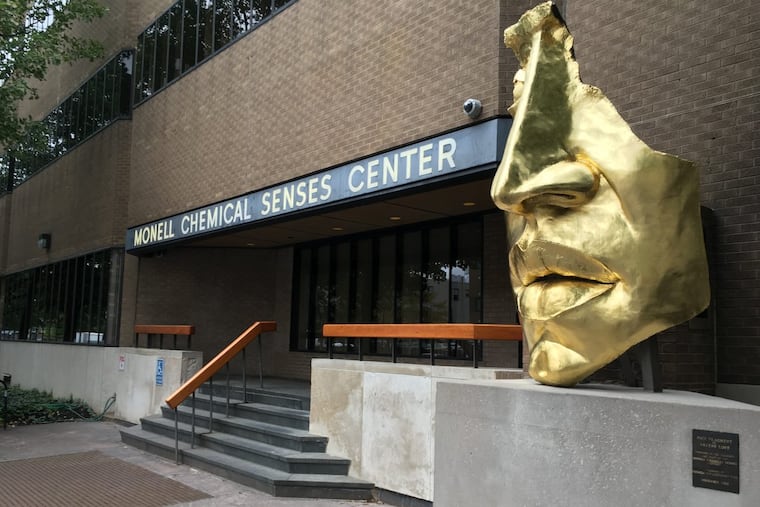Nothing to sniff at: Monell taking its odor and taste research to Jefferson health
Monell's trailblazing research on chemosensory receptors will soon aid in the care and feeding of Jefferson patients.

Sniffing great synergies, Thomas Jefferson University and the Monell Chemical Senses Center shared plans to merge at a cheery ceremony Thursday at Monell's University City headquarters.
While Monell has seen its "cyclically awarded" federal research grants curtailed of late, the center remains a global player in taste and smell research, collaborating with major health organizations and publishing dozens of papers annually, said president and director Robert Margolskee. The group, whose distinctive and freshly re-gilded mouth-and-nose sculpture sits outside its 3500 Market Street location, is poised to celebrate its 50th anniversary in late 2018.
If the deal is completed by year's end, as hoped, Jefferson would cement its reputation as the Pac-Man of regional health systems. The deal would mark Jefferson's fifth merger since 2015.
Of late, Monell's team — 21 faculty members, 25 more research associates and postdoctoral fellows, plus a dozen administrators and a steady flow of visiting affiliated scientists — have scored important insights on the functioning of chemosensory receptors in the body to detect and mount defenses against deadly pathogens. It's also been discovering how the detection of bodily odors can be used to diagnose diseases such as ovarian cancer and then monitor treatment.
Margolskee envisions "tremendous synergies" between Monell and Jefferson, "identifying solutions to nutrition-related diseases such as obesity, hypertension and heart disease" and addressing "cancer, infectious disease and neuro-degenerative diseases such as Alzheimer's." Monell associate director Nancy Rawson predicts productive collaborations with researchers at Jefferson's ear, nose, and throat department and Wills Eye Hospital.
Engagements in "academic-industrial consortia" will remain a major portion of Monell's nonprofit operations, offsetting current declines in federal funding for research.
Its 40 current consumer-world partners include a who's-who of companies from the food, beverage, fragrance, pharmaceutical and chemical industries — such household names as Campbell Soup, Estee Lauder, Johnson & Johnson, Mars Corp., Pfizer, Procter & Gamble, Suntory and Unilever. Collectively, their participation in sponsorships and research collaborations contributed about a third of Monell's reported $13.8 million revenues for 2015-16 — down about a million from years prior, and tracking almost $1 million under Monell's total expenses for the same period.
Monell has never participated in the testing, development or commercialization of specific products, but has been told its pure science has benefited causes such as "reducing salt and sugar in foods without reducing palatability, improving products and developing strategies for reducing malodors in the environment and helping to manage wildlife using nonlethal repellents," noted Leslie Stein, Monell's director for science communications.
Jefferson president/chief executive Stephen Klasko has been on an expansionist tear since dismantling much of the former Jefferson Health System in 2014. Jefferson combined forces with Abington Health in 2015 and Aria in 2016 – giving the combined medical operation a total of 23,000 employees, 5,000 physicians/practitioners, 5,770 nurses and 2,217 in-patient beds. In June, Jeff completed its three-years-in-the-making merger with Philadelphia University, with the latter's president Stephen Spinelli Jr. becoming chancellor of the combined Jefferson University operations, which includes the Sidney Kimmel Medical College.
Given his background in finance and running the "makers"-minded university in East Falls, Spinelli said he was all in favor of Monell research extending beyond published papers to actual products.
Jefferson also has newly finalized its deal with Kennedy Health in South Jersey, adding 607 licensed beds. That puts Jefferson's medical operations ahead of Penn in bed count (2,487), while still trailing area leaders Cooper University Health Care and Virtua.